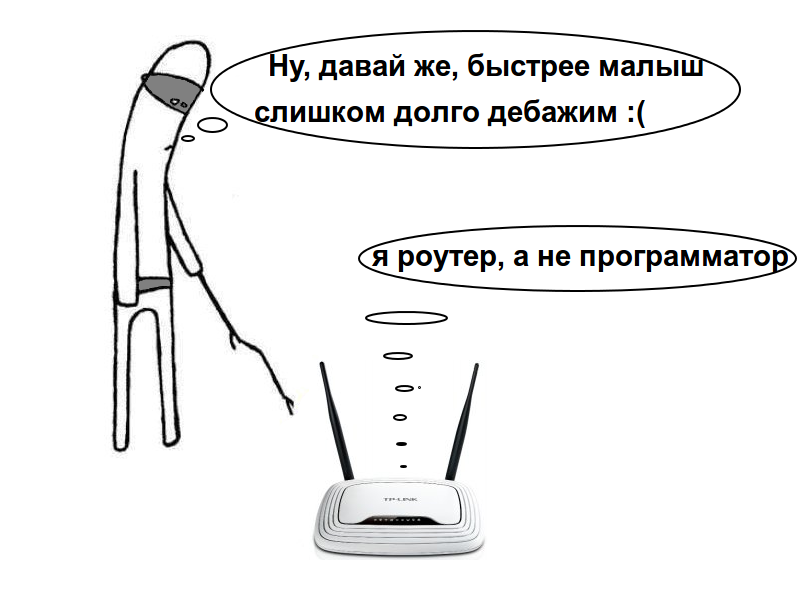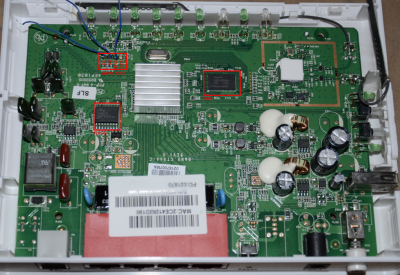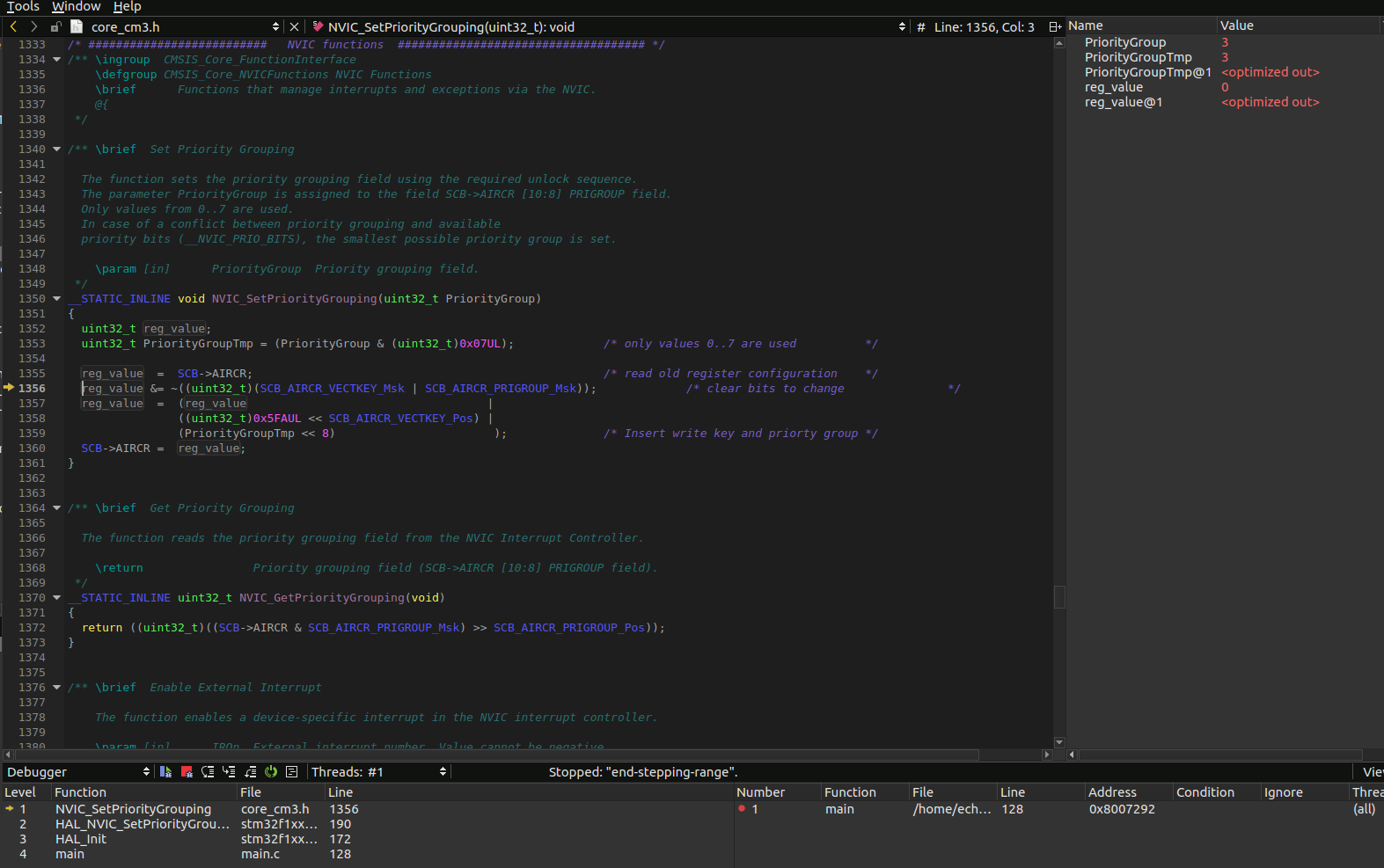
Si de repente necesita depurar varios microcontroladores / microprocesadores en Crimea, beba batidos de una oficina tapada en Khimki. Si la placa del microprocesador se encuentra en un objeto en movimiento y no hay forma de llegar al depurador JTAG (la placa se encuentra en un globo / quadrocopter). Si de repente solo necesita aislamiento galvánico entre el host y la placa que se está depurando (por ejemplo, un dispositivo de alto voltaje). Y es bueno que siga siendo barato, alegre y universal para el fabricante (STM, Broadcom, Xilinx, etc.) o la arquitectura (ARM, MIPS, FPGA, etc.). Entonces necesita un enrutador, sí, solo un enrutador, por ejemplo, como este.
 Imagen de sagemcom.ru
Imagen de sagemcom.ruMiremos adentro:
 wiki.openwrt.org
wiki.openwrt.orgEntonces, este es Sagem F @ ST2704 V2, distribuido por Rostelecom en todo el país. Tenemos un núcleo de arquitectura SoC BCM6328 MIPS, 320 MHz, un par de puertos USB soldados [1]. Hay wifi y ethernet. Y la mejor parte es el lanzamiento de openwrt para este modelo. Todo lo que se necesita del equipo para los objetivos anteriores.
Inmediatamente surge la idea de recoger st-link e intentar reenviar USB a través de la red. Parece una muleta, lo más probable es que prometa trabajar no rápido y no muy estable, la sobrecarga es enorme. Nos fijamos más en lo que se puede hacer.
Puede portar openocd a openwrt, tomar un chip st-link o ftdi e iniciar el servidor gdb. Afortunadamente, openocr ya fue portado a openwrt. Parece suficiente detenerse en esta opción. Pero quiero ver qué otras opciones nos ofrece openocd. Y aquí en la documentación se encuentra la interfaz sysfsgpio. Lo que necesita es posible controlar señales tck, tdi, tdo, herramientas normales de Linux del sistema operativo a través de / sys / class / gpio en los pines soldados del chip.
Lo intentamos Para comenzar, recopile openwrt (usando la rama chaos_calmer) junto con openocd. Por defecto, en los GPIO soldados, las funciones de indicación de luz son fijas, así como los botones de sondeo para ejecutar algunos comandos (rfkill, reset y wpsc). Para que no interfieran, los apagué quitando los módulos del núcleo correspondientes del ensamblaje.
$cat target/linux/brcm63xx/config-3.18 b/target/linux/brcm63xx/config-3.18 ...
montaje en sí:
./scripts/feeds update -a ./scripts/feeds install -a make V=s
Firmware:
mtd -q write openwrt-brcm63xx-generic-F@ST2704V2-squashfs-cfe.bin linux
Para la prueba sysfsgpio compilamos la configuración:
root@OpenWrt:~
Conéctese como en la foto:

Lanzamos:
root@OpenWrt:~# openocd -f sysfs.cfg.2.11 Open On-Chip Debugger 0.10.0+dev-00085-gfced6ac6-dirty (2017-03-xx-21:49) Licensed under GNU GPL v2 For bug reports, read http://openocd.org/doc/doxygen/bugs.html SysfsGPIO num: swclk = 482 SysfsGPIO num: swdio = 491 SysfsGPIO num: trst = 481 adapter speed: 1000 kHz adapter_nsrst_delay: 100 none separate cortex_m reset_config sysresetreq Info : SysfsGPIO JTAG/SWD bitbang driver Info : SWD only mode enabled (specify tck, tms, tdi and tdo gpios to add JTAG mode) Warn : gpio 482 is already exported Warn : gpio 491 is already exported Info : This adapter doesn't support configurable speed Info : SWD DPIDR 0x1ba01477 Info : stm32f1x.cpu: hardware has 6 breakpoints, 4 watchpoints
Ejecute la depuración en el IDE, todo funciona.

Solo muy lentamente.
Intentamos cuantificar la velocidad, vaya al enrutador telnet:
telnet 10.65.9.239 4444
Hacemos un volcado de memoria.
> dump_image dump.bin 0x08000000 0x1ffff dumped 131071 bytes in 55.013523s (2.327 KiB/s)
Hmm, por ejemplo, st-linkv2 en mi host ofrece una velocidad de aproximadamente 45 KiB / s. ¡20 veces la diferencia!

El punto, por supuesto, se debe al trabajo lento con archivos en / sys / class / gpio. Husmeando en openocd. Encuentre el controlador de interfaz para RaspberryPi (src / jtag / drivers / bcm2835gpio.c). A juzgar por las pruebas [5], su velocidad debería ser similar a la de st-link. Esto se logra, en gran parte, debido al acceso directo a los registros GPIO. Haremos lo mismo para nuestro SoC, y esto también será cierto para toda la familia de chips bcm63xx.
tal interfaz resultó #ifdef HAVE_CONFIG_H #include "config.h" #endif #include <jtag/interface.h> #include "bitbang.h" #include <sys/mman.h> /* * Helper func to determine if gpio number valid * * Assume here that there will be less than 1000 gpios on a system */ static int is_gpio_valid(int gpio) { return gpio >= 0 && gpio < 32; } off_t address_dir = NULL; off_t address_val = NULL; static int dev_mem_fd = -1; static volatile uint32_t *pio_base = NULL; static volatile uint32_t *pval_base = NULL; static volatile uint32_t *pads_base = NULL; static unsigned int jtag_delay = 0; static void set_dir_gpio(const int gpio, const int direction) { if(direction) *pio_base |= 1 << gpio; else *pio_base &= ~(1 << gpio); } static void set_value_gpio(const int gpio, const int value) { if(value) *pval_base |= 1 << gpio; else *pval_base &= ~(1 << gpio); for (unsigned int i = 0; i < jtag_delay; i++) asm volatile (""); } static int read_gpio(const int gpio) { uint32_t val = *pval_base & (1 << gpio); val = val ? 1 : 0; return val; } static int setup_bcm63xx_gpio(int gpio, int is_output, int init_high) { char buf[40]; char gpiostr[4]; int ret; if (!is_gpio_valid(gpio)) return ERROR_OK; if((address_dir == NULL) || (address_val == NULL)){ perror("address of gpio register don't set"); return ERROR_FAIL; } if( dev_mem_fd < 0 ) { dev_mem_fd = open("/dev/mem", O_RDWR | O_SYNC); if (dev_mem_fd < 0) { perror("open"); return ERROR_FAIL; } const uint32_t mapped_size = getpagesize(); const off_t target_mmap = address_dir & ~(off_t)(mapped_size - 1); pads_base = mmap(NULL, mapped_size, PROT_READ | PROT_WRITE, MAP_SHARED, dev_mem_fd, target_mmap); if (pads_base == MAP_FAILED) { perror("mmap. Check correct register address."); close(dev_mem_fd); return ERROR_FAIL; } pio_base = (char*)pads_base + (unsigned)(address_dir - target_mmap); pval_base = (char*)pads_base + (unsigned)(address_val - target_mmap); } set_dir_gpio(gpio, is_output); set_value_gpio(gpio, init_high); return 0; } /* gpio numbers for each gpio. Negative values are invalid */ static int tck_gpio = -1; static int tms_gpio = -1; static int tdi_gpio = -1; static int tdo_gpio = -1; static int trst_gpio = -1; static int srst_gpio = -1; static int swclk_gpio = -1; static int swdio_gpio = -1; /* * file descriptors for /sys/class/gpio/gpioXX/value * Set up during init. */ static int tck_fd = -1; static int tms_fd = -1; static int tdi_fd = -1; static int tdo_fd = -1; static int trst_fd = -1; static int srst_fd = -1; static int swclk_fd = -1; static int swdio_fd = -1; static int last_swclk; static int last_swdio; static bool last_stored; static bool swdio_input; static void bcm63xx_gpio_swdio_drive(bool is_output) { set_dir_gpio(swdio_gpio, is_output ? 1 : 0); last_stored = false; swdio_input = !is_output; } static int bcm63xx_gpio_swdio_read(void) { return read_gpio(swdio_gpio); } static void bcm63xx_gpio_swdio_write(int swclk, int swdio) { const char one[] = "1"; const char zero[] = "0"; size_t bytes_written; if (!swdio_input) { if (!last_stored || (swdio != last_swdio)) { set_value_gpio(swdio_gpio, swdio ? 1 : 0); } } /* write swclk last */ if (!last_stored || (swclk != last_swclk)) { set_value_gpio(swclk_gpio, swclk ? 1 : 0); } last_swdio = swdio; last_swclk = swclk; last_stored = true; } /* * Bitbang interface read of TDO * * The bcm63xx value will read back either '0' or '1'. The trick here is to call * lseek to bypass buffering in the bcm63xx kernel driver. */ static int bcm63xx_gpio_read(void) { return read_gpio(tdo_gpio); } /* * Bitbang interface write of TCK, TMS, TDI * * Seeing as this is the only function where the outputs are changed, * we can cache the old value to avoid needlessly writing it. */ static void bcm63xx_gpio_write(int tck, int tms, int tdi) { if (swd_mode) { bcm63xx_gpio_swdio_write(tck, tdi); return; } const char one[] = "1"; const char zero[] = "0"; static int last_tck; static int last_tms; static int last_tdi; static int first_time; size_t bytes_written; if (!first_time) { last_tck = !tck; last_tms = !tms; last_tdi = !tdi; first_time = 1; } if (tdi != last_tdi) { set_value_gpio(tdi_gpio,tdi); } if (tms != last_tms) { set_value_gpio(tms_gpio,tms); } /* write clk last */ if (tck != last_tck) { set_value_gpio(tck_gpio,tck); } last_tdi = tdi; last_tms = tms; last_tck = tck; } /* * Bitbang interface to manipulate reset lines SRST and TRST * * (1) assert or (0) deassert reset lines */ static void bcm63xx_gpio_reset(int trst, int srst) { LOG_DEBUG("bcm63xx_gpio_reset"); const char one[] = "1"; const char zero[] = "0"; size_t bytes_written; /* assume active low */ if (srst_fd >= 0) { set_value_gpio(srst_gpio,srst); } /* assume active low */ if (trst_fd >= 0) { set_value_gpio(trst_gpio,trst); } } COMMAND_HANDLER(bcm63xx_gpio_handle_jtag_gpionums) { if (CMD_ARGC == 4) { COMMAND_PARSE_NUMBER(int, CMD_ARGV[0], tck_gpio); COMMAND_PARSE_NUMBER(int, CMD_ARGV[1], tms_gpio); COMMAND_PARSE_NUMBER(int, CMD_ARGV[2], tdi_gpio); COMMAND_PARSE_NUMBER(int, CMD_ARGV[3], tdo_gpio); } else if (CMD_ARGC != 0) { return ERROR_COMMAND_SYNTAX_ERROR; } command_print(CMD_CTX, "bcm63xx_GPIO nums: tck = %d, tms = %d, tdi = %d, tdo = %d", tck_gpio, tms_gpio, tdi_gpio, tdo_gpio); return ERROR_OK; } COMMAND_HANDLER(bcm63xx_gpio_handle_jtag_gpionum_tck) { if (CMD_ARGC == 1) COMMAND_PARSE_NUMBER(int, CMD_ARGV[0], tck_gpio); command_print(CMD_CTX, "bcm63xx_GPIO num: tck = %d", tck_gpio); return ERROR_OK; } COMMAND_HANDLER(bcm63xx_gpio_handle_jtag_gpionum_tms) { if (CMD_ARGC == 1) COMMAND_PARSE_NUMBER(int, CMD_ARGV[0], tms_gpio); command_print(CMD_CTX, "bcm63xx_GPIO num: tms = %d", tms_gpio); return ERROR_OK; } COMMAND_HANDLER(bcm63xx_gpio_handle_jtag_gpionum_tdo) { if (CMD_ARGC == 1) COMMAND_PARSE_NUMBER(int, CMD_ARGV[0], tdo_gpio); command_print(CMD_CTX, "bcm63xx_GPIO num: tdo = %d", tdo_gpio); return ERROR_OK; } COMMAND_HANDLER(bcm63xx_gpio_handle_jtag_gpionum_tdi) { if (CMD_ARGC == 1) COMMAND_PARSE_NUMBER(int, CMD_ARGV[0], tdi_gpio); command_print(CMD_CTX, "bcm63xx_GPIO num: tdi = %d", tdi_gpio); return ERROR_OK; } COMMAND_HANDLER(bcm63xx_gpio_handle_jtag_gpionum_srst) { if (CMD_ARGC == 1) COMMAND_PARSE_NUMBER(int, CMD_ARGV[0], srst_gpio); command_print(CMD_CTX, "bcm63xx_GPIO num: srst = %d", srst_gpio); return ERROR_OK; } COMMAND_HANDLER(bcm63xx_gpio_handle_jtag_gpionum_trst) { if (CMD_ARGC == 1) COMMAND_PARSE_NUMBER(int, CMD_ARGV[0], trst_gpio); command_print(CMD_CTX, "bcm63xx_GPIO num: trst = %d", trst_gpio); return ERROR_OK; } COMMAND_HANDLER(bcm63xx_gpio_handle_swd_gpionums) { if (CMD_ARGC == 2) { COMMAND_PARSE_NUMBER(int, CMD_ARGV[0], swclk_gpio); COMMAND_PARSE_NUMBER(int, CMD_ARGV[1], swdio_gpio); } else if (CMD_ARGC != 0) { return ERROR_COMMAND_SYNTAX_ERROR; } command_print(CMD_CTX, "bcm63xx_GPIO nums: swclk = %d, swdio = %d", swclk_gpio, swdio_gpio); return ERROR_OK; } COMMAND_HANDLER(bcm63xx_gpio_handle_swd_gpionum_swclk) { if (CMD_ARGC == 1) COMMAND_PARSE_NUMBER(int, CMD_ARGV[0], swclk_gpio); command_print(CMD_CTX, "bcm63xx_GPIO num: swclk = %d", swclk_gpio); return ERROR_OK; } COMMAND_HANDLER(bcm63xx_gpio_handle_swd_gpionum_swdio) { if (CMD_ARGC == 1) COMMAND_PARSE_NUMBER(int, CMD_ARGV[0], swdio_gpio); command_print(CMD_CTX, "bcm63xx_GPIO num: swdio = %d", swdio_gpio); return ERROR_OK; } COMMAND_HANDLER(bcm63xx_gpio_jtag_delay) { if (CMD_ARGC == 1) COMMAND_PARSE_NUMBER(int, CMD_ARGV[0], jtag_delay); command_print(CMD_CTX, "bcm63xx_GPIO jtag_delay:= %d tics", jtag_delay); return ERROR_OK; } COMMAND_HANDLER(bcm63xx_gpio_adresses) { if (CMD_ARGC == 2) { COMMAND_PARSE_NUMBER(u32, CMD_ARGV[0], address_dir); COMMAND_PARSE_NUMBER(u32, CMD_ARGV[1], address_val); } else if (CMD_ARGC != 0) { return ERROR_COMMAND_SYNTAX_ERROR; } command_print(CMD_CTX, "bcm63xx_GPIO address: direction = %x, value = %x", address_dir, address_val); return ERROR_OK; } static const struct command_registration bcm63xx_gpio_command_handlers[] = { { .name = "bcm63xx_gpio_jtag_nums", .handler = &bcm63xx_gpio_handle_jtag_gpionums, .mode = COMMAND_CONFIG, .help = "gpio numbers for tck, tms, tdi, tdo. (in that order)", .usage = "(tck tms tdi tdo)* ", }, { .name = "bcm63xx_gpio_tck_num", .handler = &bcm63xx_gpio_handle_jtag_gpionum_tck, .mode = COMMAND_CONFIG, .help = "gpio number for tck.", }, { .name = "bcm63xx_gpio_tms_num", .handler = &bcm63xx_gpio_handle_jtag_gpionum_tms, .mode = COMMAND_CONFIG, .help = "gpio number for tms.", }, { .name = "bcm63xx_gpio_tdo_num", .handler = &bcm63xx_gpio_handle_jtag_gpionum_tdo, .mode = COMMAND_CONFIG, .help = "gpio number for tdo.", }, { .name = "bcm63xx_gpio_tdi_num", .handler = &bcm63xx_gpio_handle_jtag_gpionum_tdi, .mode = COMMAND_CONFIG, .help = "gpio number for tdi.", }, { .name = "bcm63xx_gpio_srst_num", .handler = &bcm63xx_gpio_handle_jtag_gpionum_srst, .mode = COMMAND_CONFIG, .help = "gpio number for srst.", }, { .name = "bcm63xx_gpio_trst_num", .handler = &bcm63xx_gpio_handle_jtag_gpionum_trst, .mode = COMMAND_CONFIG, .help = "gpio number for trst.", }, { .name = "bcm63xx_gpio_swd_nums", .handler = &bcm63xx_gpio_handle_swd_gpionums, .mode = COMMAND_CONFIG, .help = "gpio numbers for swclk, swdio. (in that order)", .usage = "(swclk swdio)* ", }, { .name = "bcm63xx_gpio_swclk_num", .handler = &bcm63xx_gpio_handle_swd_gpionum_swclk, .mode = COMMAND_CONFIG, .help = "gpio number for swclk.", }, { .name = "bcm63xx_gpio_swdio_num", .handler = &bcm63xx_gpio_handle_swd_gpionum_swdio, .mode = COMMAND_CONFIG, .help = "gpio number for swdio.", }, { .name = "bcm63xx_gpio_jtag_delay", .handler = &bcm63xx_gpio_jtag_delay, .mode = COMMAND_CONFIG, .help = "qty tics gpio delay.", }, { .name = "bcm63xx_gpio_adresses", .handler = &bcm63xx_gpio_adresses, .mode = COMMAND_CONFIG, .help = "addresses for direction and value setup. (in that order)", .usage = "(address_dir address_val)* ", }, COMMAND_REGISTRATION_DONE }; static int bcm63xx_gpio_init(void); static int bcm63xx_gpio_quit(void); static const char * const bcm63xx_gpio_transports[] = { "jtag", "swd", NULL }; struct jtag_interface bcm63xxgpio_interface = { .name = "bcm63xxgpio", .supported = DEBUG_CAP_TMS_SEQ, .execute_queue = bitbang_execute_queue, .transports = bcm63xx_gpio_transports, .swd = &bitbang_swd, .commands = bcm63xx_gpio_command_handlers, .init = bcm63xx_gpio_init, .quit = bcm63xx_gpio_quit, }; static struct bitbang_interface bcm63xx_gpio_bitbang = { .read = bcm63xx_gpio_read, .write = bcm63xx_gpio_write, .reset = bcm63xx_gpio_reset, .swdio_read = bcm63xx_gpio_swdio_read, .swdio_drive = bcm63xx_gpio_swdio_drive, .blink = 0 }; static void unusing_all_gpio(void) { munmap(pads_base, sysconf(_SC_PAGE_SIZE)); close(dev_mem_fd); LOG_INFO("unusing_all_gpio\n"); } static bool bcm63xx_gpio_jtag_mode_possible(void) { if (!is_gpio_valid(tck_gpio)) return 0; if (!is_gpio_valid(tms_gpio)) return 0; if (!is_gpio_valid(tdi_gpio)) return 0; if (!is_gpio_valid(tdo_gpio)) return 0; return 1; } static bool bcm63xx_gpio_swd_mode_possible(void) { if (!is_gpio_valid(swclk_gpio)) return 0; if (!is_gpio_valid(swdio_gpio)) return 0; return 1; } static int bcm63xx_gpio_init(void) { bitbang_interface = &bcm63xx_gpio_bitbang; LOG_INFO("bcm63xx_gpio JTAG/SWD bitbang driver"); if (bcm63xx_gpio_jtag_mode_possible()) { if (bcm63xx_gpio_swd_mode_possible()) LOG_INFO("JTAG and SWD modes enabled"); else LOG_INFO("JTAG only mode enabled (specify swclk and swdio gpio to add SWD mode)"); if (!is_gpio_valid(trst_gpio) && !is_gpio_valid(srst_gpio)) { LOG_ERROR("Require at least one of trst or srst gpios to be specified"); return ERROR_JTAG_INIT_FAILED; } } else if (bcm63xx_gpio_swd_mode_possible()) { LOG_INFO("SWD only mode enabled (specify tck, tms, tdi and tdo gpios to add JTAG mode)"); } else { LOG_ERROR("Require tck, tms, tdi and tdo gpios for JTAG mode and/or swclk and swdio gpio for SWD mode"); return ERROR_JTAG_INIT_FAILED; } /* * Configure TDO as an input, and TDI, TCK, TMS, TRST, SRST * as outputs. Drive TDI and TCK low, and TMS/TRST/SRST high. * For SWD, SWCLK and SWDIO are configures as output high. */ if (tck_gpio >= 0) { tck_fd = setup_bcm63xx_gpio(tck_gpio, 1, 0); if (tck_fd < 0) goto out_error; } if (tms_gpio >= 0) { tms_fd = setup_bcm63xx_gpio(tms_gpio, 1, 1); if (tms_fd < 0) goto out_error; } if (tdi_gpio >= 0) { tdi_fd = setup_bcm63xx_gpio(tdi_gpio, 1, 0); if (tdi_fd < 0) goto out_error; } if (tdo_gpio >= 0) { tdo_fd = setup_bcm63xx_gpio(tdo_gpio, 0, 0); if (tdo_fd < 0) goto out_error; } /* assume active low*/ if (trst_gpio >= 0) { trst_fd = setup_bcm63xx_gpio(trst_gpio, 1, 1); if (trst_fd < 0) goto out_error; } /* assume active low*/ if (srst_gpio >= 0) { srst_fd = setup_bcm63xx_gpio(srst_gpio, 1, 1); if (srst_fd < 0) goto out_error; } if (swclk_gpio >= 0) { swclk_fd = setup_bcm63xx_gpio(swclk_gpio, 1, 0); if (swclk_fd < 0) goto out_error; } if (swdio_gpio >= 0) { swdio_fd = setup_bcm63xx_gpio(swdio_gpio, 1, 0); if (swdio_fd < 0) goto out_error; } if (bcm63xx_gpio_swd_mode_possible()) { if (swd_mode) bitbang_swd_switch_seq(JTAG_TO_SWD); else bitbang_swd_switch_seq(SWD_TO_JTAG); } return ERROR_OK; out_error: unusing_all_gpio(); return ERROR_JTAG_INIT_FAILED; } static int bcm63xx_gpio_quit(void) { unusing_all_gpio(); return ERROR_OK; }
En comparación con sysfsgpio, agregó un par de opciones:
- bcm63xx_gpio_jtag_delay
- bcm63xx_gpio_adresses
La primera configuración establece el retraso entre la conmutación de pines, es un análogo indirecto de bcm2835gpio_speed_coeffs para el controlador RaspberryPi, que establece la frecuencia jtag. Por ejemplo, con un retraso de cero, la frecuencia de conmutación fue de aproximadamente un megahercio, todo funcionó de manera bastante estable, pero para mayor confiabilidad es mejor poder configurar este parámetro.
Y la segunda opción es un análogo de bcm2835gpio_peripheral_base, solo para ello debe registrar dos direcciones para el registro, que establece la función de entrada / salida de los pines, y el registro, que es responsable del valor lógico de entrada / salida en gpio. Al principio, tomó valores de registro de los archivos de encabezado del núcleo. Pero nada funcionó con estos valores. Resultó que no se puede acceder directamente a los registros periféricos desde el espacio del usuario, es decir Se debe realizar una reasignación en el núcleo. Es bueno que el controlador gpio ya haya implementado esto para mí y los valores necesarios se puedan tomar de / proc / iomem.
Agregue nuestra interfaz al ensamblaje openocdRecuerde agregar --enable-bcm63xxgpio a CONFIGURE_ARGS en el archivo feeds / packages / utils / openocd / Makefile.
Reconstruimos, instalamos y ejecutamos en el enrutador:
root@OpenWrt:~# openocd -f interface/bcm63xx-swd.cfg -f target/stm32f1x.cfg Open On-Chip Debugger 0.10.0+dev-00085-gfced6ac6-dirty (2017-03-xx-21:49) Licensed under GNU GPL v2 For bug reports, read http://openocd.org/doc/doxygen/bugs.html bcm63xx_GPIO num: swclk = 2 bcm63xx_GPIO num: swdio = 11 bcm63xx_GPIO jtag_delay:= 10 tics bcm63xx_GPIO address: direction = 10000084, value = 1000008c adapter speed: 1000 kHz adapter_nsrst_delay: 100 none separate cortex_m reset_config sysresetreq Info : bcm63xx_gpio JTAG/SWD bitbang driver Info : SWD only mode enabled (specify tck, tms, tdi and tdo gpios to add JTAG mode) Info : This adapter doesn't support configurable speed Info : SWD DPIDR 0x1ba01477 Info : stm32f1x.cpu: hardware has 6 breakpoints, 4 watchpoints
Verifique la velocidad del basurero.
> dump_image dump.bin 0x08000000 0x1ffff dumped 131071 bytes in 4.729815s (27.062 KiB/s)
Muy bien, perdemos dos veces en algún lugar de st-link y frambuesa, pero a simple vista la diferencia no es notable. No hay frisos durante la depuración, bueno, y espere un par de segundos para parpadear durante el firmware - "presumir".
Todas las pruebas se llevaron a cabo en el microcontrolador STM32F103C8T6 y, desafortunadamente, no había jtag en la placa depurada solo en la interfaz SWD, en la placa depurada. En consecuencia, por lo tanto, no puedo garantizar el trabajo completo en jtag. Además, no debemos olvidarnos de la coordinación de los niveles de señal (en particular para MK AVR).
El enrutador en sí fue tomado de una pila de basura, entre los cuales estaba lleno de Sagem F @ st 2704V2 y V7. Desafortunadamente, todos los dispositivos estaban fuera de servicio. Pero fue posible restaurar el tablero sin problemas (ver [2]).
Si alguien está listo para hacer un depurador / programador de este constructor, entonces está listo para compartir sus acciones con el público sin costo alguno, quitando toda responsabilidad y fondos para el envío (desde la ciudad predeterminada).
Firmware actualizado
aquí .
Te advierto que la configuración predeterminada de red y firewall ha cambiado.
Eso es todo, buena depuración!
Lista de recursos útiles.
- wiki.openwrt.org/toh/sagem/fast2704
- radiohlam.ru/forum/viewtopic.php?f=54&t=3749
- openocd.org
- developer.mbed.org/handbook/CMSIS-DAP
- github.com/rogerclarkmelbourne/Arduino_STM32/wiki/Programming-an-STM32F103XXX-with-a-generic-ST-Link-V2-programmer-from-Linux